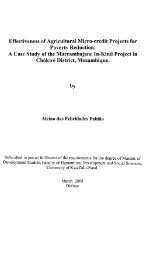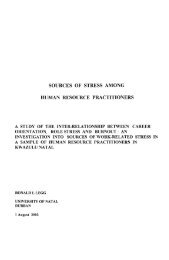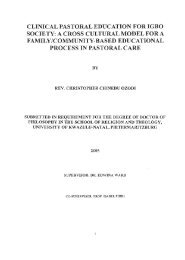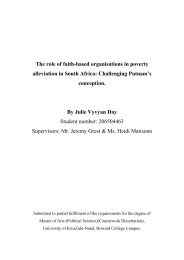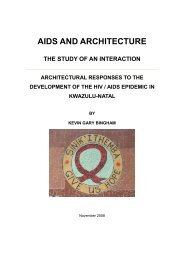View/Open - ResearchSpace - University of KwaZulu-Natal
View/Open - ResearchSpace - University of KwaZulu-Natal
View/Open - ResearchSpace - University of KwaZulu-Natal
You also want an ePaper? Increase the reach of your titles
YUMPU automatically turns print PDFs into web optimized ePapers that Google loves.
Micro level<br />
Although volunteer caregivers were equipped with knowledge and skills on infection control<br />
practices such as practicing good hygiene; wearing protective clothing; disposing <strong>of</strong> the waste<br />
safely, they could not follow all infection control protocols due to poor quality and<br />
insufficient materials. Knowledge and skills on infection control without adequate materials<br />
is not worthwhile. Most participants in this study feared contagion and felt discouraged to<br />
perform their duties without materials. This could cause volunteer caregivers to abandon<br />
some patients. This also could also add psychological stress to volunteer caregivers and cause<br />
them to drop out. These findings show an expansion <strong>of</strong> knowledge in this area. However,<br />
there is need for the volunteer caregivers in HBCOs to form a forum to address materials<br />
issues.<br />
5.4 Challenges confronted by volunteer caregivers and strategies developed to deal with<br />
the challenges regarding infection control practices<br />
Macro and exo level<br />
The mission for HBCOs programs is to provide on-going care to HIV/AIDS clients in order<br />
to alleviate pain and also to provide hope (Walker, Aceng, Tindyebwa, Nabyonga, Ogwang<br />
& Kiiza, nd). The South African community care worker management policy framework<br />
(2009) states that, international organisations and non-pr<strong>of</strong>it organizations are the main<br />
funders <strong>of</strong> HBCOs. However, the findings <strong>of</strong> this study show that most HBCOs depended<br />
heavily on the government, NGOs and donors for resources. The government, through the<br />
department <strong>of</strong> health, is responsible for providing home based care organizations with HBC<br />
kits for volunteer caregivers. But at the time <strong>of</strong> this research materials contained in the kits<br />
were <strong>of</strong> poor quality and inadequate to carter for the patients that volunteer caregivers cared<br />
for because they were only supplied once a month. For example 97% <strong>of</strong> the volunteer givers<br />
did not have HBC kits at the time <strong>of</strong> research.<br />
Insufficient materials inhibited volunteer caregivers to follow the infection control practice<br />
protocols such as wearing protective clothing like gloves, masks, aprons and practicing<br />
64





